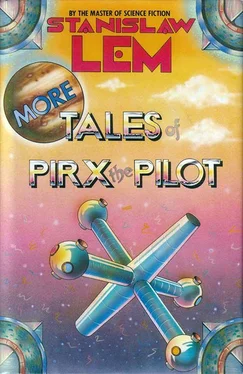Stanislaw Lem
MORE TALES OF PIRX THE PILOT
PIRX’S TALE
Translated by Louis Iribarne with the assistance of Magdalena Majcherczyk
Sci-fi? Sure, I like it, but only the trashy stuff. Not so much trashy as phony The kind I can dip into between shifts, read a few pages at a time, and then drop. Oh, I read good books, too, but only Earthside. Why that is, I don’t really know. Never stopped to analyze it. Good books tell the truth, even when they’re about things that never have been and never will be. They’re truthful in a different way. When they talk about outer space, they make you feel the silence, so unlike the Earthly kind—and the lifelessness. Whatever the adventures, the message is always the same: humans will never feel at home out there. Earth has something random, fickle about it—here a tree, there a wall or garden, over the horizon another horizon, beyond the mountain a valley … but not out there.
People on Earth can’t imagine what a pain the stars are—what a drag it is to cruise the cosmos, even for a year at full thrust, with never a change of scenery! We fly, sail around the world, and think: So that’s what outer space is like! But there’s just no comparison.
Once, on my way back from a patrol, I was tuned in to a pilots’ argument somewhere up around the Arbiter —the usual scuffle over who had landing priority—when I happened to sight another homeward-bound ship. The guy must have thought he was alone, because he was tooling around as if in an epileptic fit. All pilots know the feeling: you’re spaceborne only a few days, when, wham, it hits you—that goofy urge to pull something, anything, to rev to full, hang a U-turn, and let your tongue stick out.
I used to think it was bad business to get so freaked out. But you’re driven to it—by the despair, by the urge to stick out that old tongue at the cosmos. The cosmos is not a tree; maybe that’s what makes it so mind-boggling. The good books talk about that. And we don’t care to hear the truth about the stars when we’re out there, any more than a dying man likes to read about death. What we want then is something to distract us; as for me, I’ll take sci-fi, the corny, easy-to-read stuff, where everything, the cosmos included, is so tame. But it’s an adult tameness, full of calamities, murders, and other juicy horrors, yet all quite harmless, because it’s bull, from A to Z: scariness to make you smile.
The story I’m about to tell is just such a spook tale. Only this one actually happened. Never mind that, though. It was during the Year of the Quiet Sun, during a routine circumsolar round-up of the scrap revolving parallel to Mercury’s orbit—space hulks junked during the six-year construction of a giant space station at the perihelion, to be recycled for scaffolding, according to the Le Mans System, instead of being sent to the scrap yard. Le Mans was a better economist than an engineer; a station constructed of recycled scrap may have been three times as economical, but Operation Mercury had caused such tribulation that eventually nobody gave a damn what the cost savings would be. Then Le Mans had another stroke of genius: why not move this morgue back down to Earth; why let it wheel around till doomsday when it could be melted down? But to keep it profitable, the job of towing went to ships not much healthier than the hulks.
I was a rookie pilot at the time, meaning a pilot only on paper and once a month on payday. I was itching to fly so badly that I’d have flown a kiln if it had some thrust, so no sooner had I read the want ad than I was making application at Le Mans’s Brazilian office. Now, I wouldn’t go so far as to call those crews hired by Le Mans—or, rather, by his agents—a kind of cosmic foreign legion. The days of space adventurers were over, because for the most part there weren’t any more adventures to be had. Men were driven to work in space either by a fluke or by some personal hang-up—not the best qualifications for a profession that demanded more on-board grit and stamina than the merchant marine.
I’m not trying to play psychologist but to explain how I came to lose half of my crew on the first trip out. The technicians were the first to go, after they were turned into boozers by the radiotelegraph operator, a shrimp of a mestizo who knew every trick of the bootlegger’s trade—sealed plastic pouches hidden inside canisters, that sort of thing. The early space pioneers would have been shocked. Beats me how they could have believed that any man placed in orbit automatically became an angel. Or was it just a subconscious effect of that brief, blue, paradisical sky that faded so abruptly during blast-off? But why quarrel with the dead. The Mexican, who was in fact Bolivian-born, peddled marijuana on the side and loved to bait me. A mean customer, all right, but I’ve flown with worse.
Le Mans was a big man; he didn’t fuss over details, simply handed his agents a budget, and that was that. So not only did I wind up with a skeleton crew, I also had to sweat every kilowatt of thrust and to scrimp on every maneuver, because the uranographs were audited after every trip to see whether—God forbid!—ten dollars had gone up in neutrons. Never had I commanded such a ship, nor, I venture to say, had there been one quite like mine since old tramps plied the seas between Glasgow and India. But I wasn’t about to complain, and I even look back on my Pearl of the Night, I’m ashamed to say, with some nostalgia. What a name! A ship so weather-beaten that more time was spent tracking down leaks and shorts than at the helm. Every lift-off or landing was a violation of the laws of physics. And not just physics. Le Mans’s agent must have had a lot of pull in the Mercurean port, because any self-respecting controller would have padlocked the Pearl right away, from controls to pile.
As soon as we got within range of the perihelion, we’d start radar-stalking, round up the hulks, and form a train. What a time I had then: hassling with the technicians, jettisoning liquor overboard—thereby putting gallons of London dry gin into perennial orbit—and agonizing over the mathematical hell of finding approximate solutions for the problem of too many bodies. But worst of all was the idleness. Of time and space.
That’s when I would hole up in my cabin and read. Don’t remember the author’s name (it was an American) or the title (something with the word Stardust in it). Don’t remember the beginning, either, because I started it somewhere in the middle—where the hero is in the reactor chamber, talking to the pilot on the phone, and suddenly hears, “Meteoroids astern!” All this time they’re in free fall; suddenly he notices that the reactor, a huge colossus with dials like yellow eyes, is coming at him—the engine burn had caught him in zero- g . Luckily, he meets it feet first, but the acceleration yanks the receiver out of his hand; for a second he hangs on to the wire, then falls, flattened to the deck, with the receiver swinging overhead; he makes a superhuman effort to grab it, but, weighing a ton, he can’t budge a finger; finally he gets it between his teeth, just in time to give the saving command.
A memorable scene, but even better was the part describing their passage through a swarm. A dust cloud, lo and behold, big enough to blanket a third of the sky, and so thick that only the brightest stars could pierce it. And the best is yet to come, because suddenly our hero spots something on the scanners: from out of this yellowish typhoon there looms a blinding swirl with a black core. God only knows what it was, but I almost died laughing. What a perfect set-up! All that cloud business, the typhoon, the receiver—because, need I say it, at the time that guy was dangling on the telephone wire, a woman was waiting for him in his cabin. A stunner, of course. The secret agent of some cosmic tyranny—or was she one of the freedom fighters? A looker, in any case.
Читать дальше












